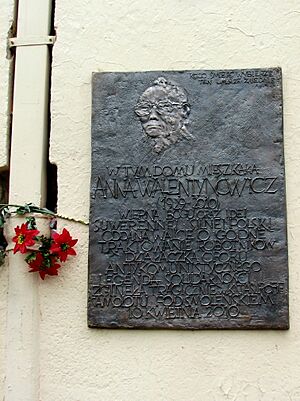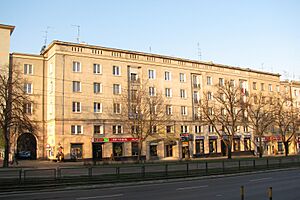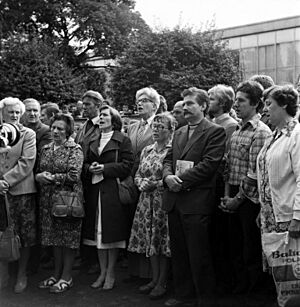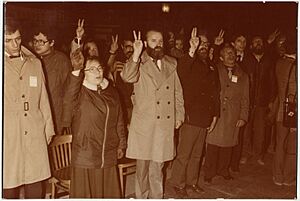Anna Walentynowicz facts for kids
Quick facts for kids
Anna Walentynowicz
|
|
|---|---|
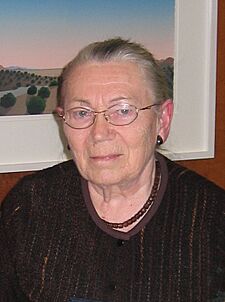
Anna Walentynowicz (2005)
|
|
| Born |
Anna Lubczyk
15 August 1929 Sinne, Równe, Poland
|
| Died | 10 April 2010 (aged 80) |
| Nationality | Polish |
| Occupation | Free trade union activist |
| Signature | |
Anna Walentynowicz (born Anna Lubczyk; 15 August 1929 – 10 April 2010) was a brave Polish activist. She helped start Solidarity, which was the first independent trade union in Eastern Europe. A trade union is a group of workers who join together to protect their rights and improve their working conditions.
In August 1980, Anna was fired from her job at the Lenin Shipyard in Gdańsk. This event sparked a huge strike at the shipyard. Soon, strikes spread across Poland, stopping work along the Baltic coast. The strike committee at the Gdańsk shipyard later became Solidarity. By September, over a million workers were on strike, making it one of the biggest strikes ever.
Anna's arrest became a rallying cry for the workers: "Bring Anna Walentynowicz Back to Work!" Some people call her the "mother of independent Poland." She died in a 2010 Polish Air Force Tu-154 crash near Smolensk, Russia, in 2010. The crash also killed Lech Kaczyński, who was the President of Poland, and many other important Polish leaders.
In 2006, Anna received Poland's highest honor, the Order of the White Eagle. In 2020, Time magazine named her one of the 100 Women of the Year who changed the world over the last century.
Contents
Anna's Early Life and Work
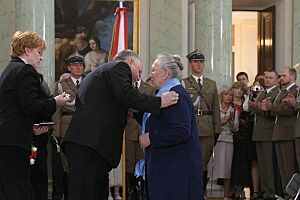
Anna Walentynowicz was born in 1929 in a village in Poland. When she was ten, during Second World War, she started working as a maid. After the war, she moved to Poland.
In 1950, Anna began working at the Lenin Shipyard in Gdańsk. She first worked as a welder and then became a crane operator. She was known as a very hard worker. However, she became unhappy with the communist system in Poland, especially after the violent events in December 1970. Anna was a strong Catholic. She believed in fairness and standing up against unfairness. She was inspired by the teachings of Pope John Paul II.
Anna started speaking out when a supervisor stole money from workers. Instead of punishing the supervisor, the authorities started bothering her. The "model worker" became a voice against the government.
Fighting for Workers' Rights
In 1978, Anna joined a new group called the Free Trade Unions of the Coast. In the early 1980s, she became a symbol of the movement against the communist government. She worked with others like Lech Wałęsa and Alina Pienkowska.
Anna helped create an underground newspaper called Robotnik Wybrzeża (The Coastal Worker). She often challenged her bosses openly.
Her Firing and the Start of Solidarity
On August 7, 1980, Anna Walentynowicz was fired from the shipyard. She was only five months away from retirement. This decision made the workers very angry. On August 14, they started a strike action to demand her return.
At first, the shipyard management agreed to the workers' demands for pay and working conditions. Lech Wałęsa and others announced the strike was over. However, Anna Walentynowicz and Alina Pienkowska convinced many workers to keep striking. They closed the shipyard gates to keep people inside. They turned the strike from just about pay into a bigger protest to support other striking workplaces.
The Gdańsk Agreement was signed on August 31, 1980. This agreement allowed workers to form free trade unions for the first time in communist countries. Soon after, the Solidarity trade union was officially recognized. It quickly grew to nearly ten million members, becoming the largest union in the world at that time.
Anna Walentynowicz shared her vision:
Our goal is not just to get a bit more money today. We must remember our true aim. Our main duty is to think about what others need. If we do this, no one will be treated unfairly. Our motto should be: "Your problems are also my problems." We must be friends and strengthen our solidarity.
Anna was an important member of Solidarity's leadership. However, some people within the union later tried to remove her from her position. They made false accusations against her. Even though these charges were proven false, some union members supported removing her. The communist party also tried to turn people against her.
In October 1981, two secret police officers tried to poison her during a meeting. She was also named "Woman of the Year" in the Netherlands.
In December 1981, the government declared martial law. This broke up Solidarity.
Disagreements with Lech Wałęsa
Anna Walentynowicz became critical of how Solidarity developed. She felt that the union's new leaders, including Lech Wałęsa, were losing touch with the ordinary workers. She believed they were getting privileges and forgetting the original goals of Solidarity.
She said:
The distance between Solidarity and the workers is why I disagree with Wałęsa. The new Solidarity leaders act too much like the old communist party. They have privileges, and the ideas of Solidarity have been forgotten.
Anna was arrested many times between 1981 and 1984. She spent a total of 19 months in jail.
She felt that Wałęsa took too much credit for Solidarity's success. She believed it was a group effort involving millions of people. She wrote a book called Cień przyszłości (The Shadow of the Future) in 1993, where she shared her concerns. A French journalist called her "The real heroine of Gdańsk."
In 1985, she spoke about her hopes:
We must not just wait. A free Poland is our goal, but no one will give us that freedom. If we do nothing, more and more of us will suffer. We must teach others, because even when Poland is free, the nation will be so tired that there will be no one to lead it.
After Communism Fell
After communism ended in 1989, Anna Walentynowicz remained active. However, she kept her distance from the new political parties linked to Solidarity. She felt that the new Solidarity leaders had forgotten the workers and the original values of social justice. She believed that some people used Solidarity for their own gain.
She often avoided anniversary celebrations organized by the new Solidarity. In 2000, she turned down an honorary citizenship from the city of Gdańsk. In 2002, during a strike at the docks, she said:
The 21 demands we made in 1980 are still important. Nothing was truly achieved. People still have to fight to be treated with respect. That is scandalous.
In 2003, she asked the government for money because she had been persecuted in the 1980s. She received some money, but she mostly gave it away to people who needed help. In 2004, Anna and other early Solidarity activists wrote an open letter to the European Parliament. They explained their concerns about how Solidarity had changed.
Anna also spoke out against the Civic Platform political party in Poland. In 2009, she organized a conference in the Polish parliament.
In 2005, Anna Walentynowicz accepted the Truman-Reagan Medal of Freedom in Washington. She received it on behalf of the first free trade union Solidarity. She was honored alongside John Paul II. A writer called her the Rosa Parks of Solidarity.
Several documentary films have been made about Anna Walentynowicz, including Wer ist Anna Walentynowicz? ("Who is Anna Walentynowicz?"). She also appeared as herself in the film Man of Iron (1981).
Her Death
Anna Walentynowicz died in a plane crash near Smolensk on April 10, 2010. She was traveling to remember the 70th anniversary of the Katyn massacre during World War II. A plaque has been placed on her house in Gdańsk, and a street intersection in Gdynia was named after her.
In 2012, it was discovered that a different person had been buried in Anna Walentynowicz's grave by mistake. The bodies were then reburied in the correct graves. In 2015, a trial began about the attempt to poison her in 1981.
Remembering Anna
In 2011, a special plaque honoring Anna Walentynowicz was put up in Gdańsk. In 2013, the Anna Walentynowicz Square was opened in Wrocław to remember her role in ending communism in Poland.
In 2015, a statue of Anna Walentynowicz was unveiled at a cemetery in Ossów. In December 2015, the main room in the office of the Chancellery of the Prime Minister of Poland was named after her.
In 2017, a street in Szczecin was renamed Anna Walentynowicz Street. Another street with her name was also established in Lublin.
In 2018, the Polish parliament declared 2019 the "Year of Anna Walentynowicz." On October 12, 2020, the President of Poland, Andrzej Duda, unveiled a monument dedicated to Anna Walentynowicz in Kyiv, Ukraine. He said she is "a symbol of the Solidarity movement, a woman who, among all the men who were there at that time, helped bring a female way of thinking about Poland."
Quotes
Here is a quote from a brochure given to workers at the Lenin Shipyard on August 14, 1980:
To the workers of the Gdansk Shipyard
We are writing to YOU, colleagues of Anna Walentynowicz. She has worked at the shipyard since 1950. She was a welder for sixteen years, then a crane operator. She received many awards for her hard work. She was always a model worker and spoke out against every wrong and unfairness.
Because of this, she became active in the independent trade union movement. Walentynowicz was fired on August 7 for "major breaking of worker's duties." We want to remind you that Anna Walentynowicz was only five months from retirement. This shows that the shipyard management does not care about public opinion or the law. They force people to do what they want. Anna Walentynowicz was a problem for them because she is a model activist who helps others. She defends others and can organize her colleagues... We ask you, defend the crane operator Walentynowicz. If you don't, many of you might end up in the same bad situation.
Signed by the Founding Committee of Independent Trade Unions and the editors of THE COASTAL WORKER: Bogdan Borusewicz, Joanna Duda-Gwiazda, Andrzej Gwiazda, Jan Karandziej, Maryla Płońska, Alina Pienkowska, Lech Wałęsa
See Also
- Solidarity (Polish trade union)
- Lech Wałęsa
- Gdańsk Shipyard
Images for kids
 | Shirley Ann Jackson |
 | Garett Morgan |
 | J. Ernest Wilkins Jr. |
 | Elijah McCoy |


